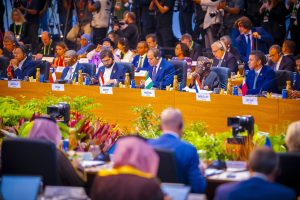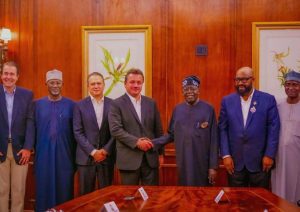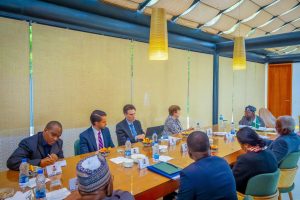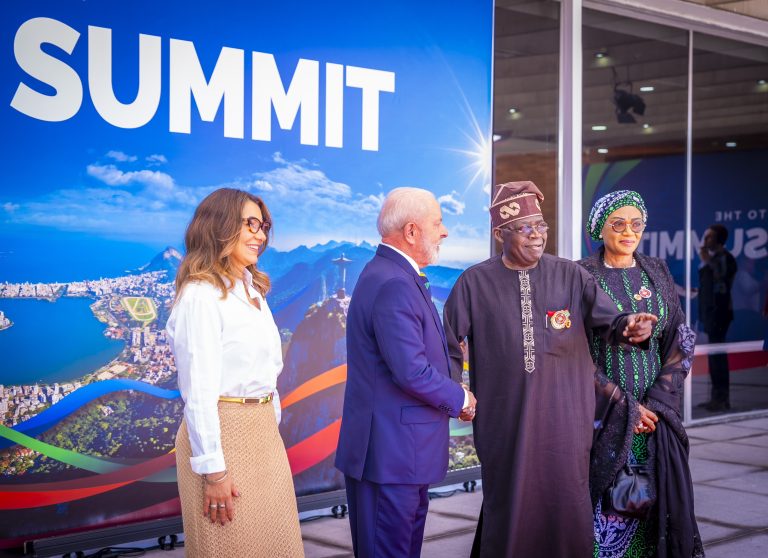By Dada Olusegun
President Bola Tinubu has superintended over an eventful couple of days for Nigeria in the area of international diplomacy. Last weekend, President Tinubu played host to the Indian Prime Minister, Narendra Modi who came to Nigeria on a historic state visit to strengthen bilateral cooperation between the world largest democracy and Nigeria, Africa’s largest democracy.
Shortly after the departure of Prime Minister Modi, President Bola Tinubu took to the air en route to Rio de Janeiro, Brazil to participate in his first ever G20 Leaders Summit. Though Nigeria is not yet a full member of the G20, it was one of the 19 guest countries participating in the Summit. The theme of this year’s summit, “Building a Just World and a Sustainable Planet”, couldn’t have been more apt in the light of current happenings around the world. I will discuss some of highlights of the President’s participation in the G20 Summit.
Nigeria joined the Global Alliance against Hunger and Poverty
Ever the Chief Marketer of Nigeria, President Bola Tinubu did not waste time as he began hawking Nigeria’s strategic interests before an elite club that accounts for over 80% of the world’s GDP between them. The President delivered a statement at the first session of the summit which focused on the fight against hunger and poverty. At the session President Tinubu officially signalled Nigeria’s membership of the newly formed Global Alliance against Hunger and Poverty which was the brainchild of Brazil’s G20 presidency.
The Alliance announced six goals it seeks to achieve by 2030 to combat hunger and extreme poverty, some of which are already part of Nigeria’s homegrown evidence-based, large-scale policies and programs for uplifting the poorest and most vulnerable people in our society. Among the announcements and commitments by the Alliance are the aim to reach 500 million people with cash transfer programs in low and lower-middle income countries until 2030, expanding high quality school meals to another 150 million children in countries facing endemic child poverty and hunger, early childhood and maternal interventions for 200 million women and children from ages 0-6yrs as well as raising billions in credit and grants through multilateral development banks for implementing those and other programs.
Nigeria already has a Social Investment Programme in place, which is set to produce an even greater impact on the lives of vulnerable Nigerians following the restructuring of the programmes under the Ministry of Humanitarian Affairs. So, Nigeria’s membership of the Global Alliance against Hunger and Poverty could not have come at a better time. Nigeria will leverage on this opportunity in addition to our homegrown SIP efforts to fight hunger and extreme poverty across the country especially as many households face economic squeeze due to ongoing reforms embarked upon by the federal government.
Tinubu canvassed for the G20 to support a UN framework Convention on Tax initially proposed by Nigeria
At the second session of the Brazil 2024 G20 Summit, which has, “Reform of the Institutions of Global Governance” as its theme, President Bola Tinubu noted that the world faces a range of complex challenges including extreme poverty, inequality, climate change, terrorism and global conflicts and that these issues are exacerbated by long-standing inequities in the global governance system, which have led to unsustainable sovereign debts, trade imbalances, unfair representations and hindered development in the Global South.
The President particularly mentioned the issue of global taxation, which impacts developing countries who have fewer multinational enterprises headquartered in them. He pointed out that the current international tax system is largely shaped to favour the interests of more affluent nations and leaves the developing countries like Nigeria at a disadvantage especially when it comes to taxing digital economies. The emergence of digital commerce had made it possible for big tech firms to shift their profits to low tax countries depriving countries where the profits were earned tax revenues. This imbalance results to significant revenue losses for developing countries, which hampers efforts towards sustainable development and economic self-reliance.
However, President Tinubu added that Nigeria alongside other member states of the African Group championed a historic initiative at the United Nations calling for a framework Convention on Tax. Recall that Nigeria in November 2023 proposed a draft UN resolution calling for a “framework convention on international tax cooperation”. This was backed by 125 countries, mostly developing countries who have suffered unfair global tax practices. 48 countries, mostly developed countries who are members of OECD voted against it.
The OECD had earlier midwifed a Global Minimum Tax deal in 2021 signed by 136 countries proposing a 15% effective minimum tax on the profit of large multinational enterprises operating outside their headquarter countries. Nigeria and eight other countries did not sign the deal. Nigeria’s representative at the OECD Inclusive Framework, Mathew Gbonjubola, said at the time that Nigeria did not sign the deal because the developed world, within the inclusive framework, was very indifferent to the concerns expressed by most developing countries on their peculiar challenges when it comes to implementation. In the 2021 deal, large MNEs in the extractive industries and regulated financial services are to be excluded from the rules on where multinationals are taxed.
It was for this reason that Nigeria in 2023 decided to spearhead the efforts towards a new global tax system under the UN framework that will be more equitable and inclusive. Even though many of the developed countries voted against the draft resolution proposed by Nigeria, it was still passed because majority of developing countries aligned with Nigeria’s position. President Bola Tinubu during the 2nd session of the G20 Summit was therefore appealing to the members of the G20, many of whom are OECD members, to support the UN effort to establish a fair, equitable and inclusive global tax system, which will go a step further than the OECD 2021 deal in addressing the concerns raised by many countries especially in the Global South.

Seek global support for Nigeria’s bid for a permanent seat at the UN Security Council
The President also in his statement during the second session of the G20 Summit emphasized the urgent need to reform and expand the United Nations Security Council to better reflect the diversity and plurality in our evolving world. President Tinubu reiterated to the member nations of this multilateral organisation why Africa should be given two permanent seats at the UN security council and Nigeria occupying one of the seats with full powers.
Call for coordinated global efforts to stem illicit financial flow from developing countries
President Bola Tinubu also expressed Nigeria’s deep commitment to support efforts aimed at stopping illicit flow of money from developing countries to the developed economies. The President reminded his G20 audience that these illicit money, increasingly moved through the help of emerging digital currencies and trading platforms deprives developing countries of the needed financial resources finance economic and social development and rightly stated that there is no better platform to resolve this issue than the G20 since its members are basically the most advanced countries that benefit from these illicit flows.
Livestock development investment from JBS S.A.
President Bola Tinubu also took full advantage of the G20 Summit in Brazil to seek for investment in Nigeria’s agricultural sector, especially in livestock. Just over a month after giving life to the Ministry of Livestock Development, President Tinubu commissioned the Minister to explore the Brazilian livestock success story and see how to replicate it in Nigeria. As a result of this presidential mandate, the Minister, Alhaji Idi Mukhtar set off for Sao Paulo, Brazil to study the livestock farming and processing success story of this agricultural belt in Brazil ahead of the arrival of President Bola Tinubu.
These efforts culminated into an investment opening with a Brazilian livestock company, JBS S.A. showing readiness to invest in Nigeria’s emerging livestock environment. JBS is one of the top three largest meat processing companies in the world with annual revenue of more than $72 billion and assets of around $42 billion. The President was on hand to receive the company’s management led by one of the Batista brothers, Wesley Batista who own the multi-billion dollar enterprise. President Tinubu as usually passionately made a pitch to the company for massive investment in Nigeria’s livestock sector highlighting the enormous amount of opportunities that abound in Nigeria’s undeveloped livestock industry.
He assured the JBS top management of very good return on investment in Nigeria and that Nigeria is ready to do business. President Tinubu who really meant business introduced the company to the Niger State Governor, Umar Bago and explained to the company that in Nigeria, states are vested with authority over land, which means they would need to work with states like Niger.
It is heartwarming that Niger under Bago’s leadership has proven to be the new frontier for modernised agriculture in Nigeria. With its massive landmass, which makes it the largest state in Nigeria, Niger would be one of the ideal locations to kick-start Nigeria’s livestock revolution. In the end, a Letter of Intent between the Nigerian Government and JBS S.A. was signed signaling the first step in an anticipated long-term mutually beneficial partnership.

President Tinubu interacts with IMF President
Still on the sidelines of the G20 leaders Summit in Rio de Janeiro, President Bola Tinubu hosted the President of the International Monetary Fund (IMF), Kristalina Georgieva where they discussed a number of issues ranging from bringing many out-of-school children into the classroom, putting in place measures to reduce the hardship on Nigerians caused by ongoing economic reforms, as well as the tax reforms embarked upon by the Tinubu administration. President Tinubu informed the IMF President that his administration’s tax reforms is geared towards expanding the economy’s tax base for inclusive developmental growth without necessarily increasing the taxes on the vulnerable Nigerians who have already given a lot.
The IMF President promised among other things to support Nigeria’s social investment programmes meant to cushion the effects of economic challenges on vulnerable groups. She also offered technical support to Nigeria to improve our budgeting process for the best outcome and expressed commitment to work with Nigeria to build resilient institutions to better manage future global economic shocks.

Bilateral Meeting with Vietnam Leader
President Bola Tinubu in one of his first functions upon arriving Rio de Janeiro, met with Lương Cường, the President of the Socialist Republic of Vietnam as they held a bilateral meeting. Both leaders discussed potential areas of cooperation, including trade, agriculture, energy, and technology, aiming to deepen economic and diplomatic relations between Nigeria and Vietnam.
A very fruitful and strategic outing for Nigeria
President Bola Tinubu’s participation in the G20 Summit was basically for the purpose of promoting Nigeria’s interests on the global stage. By engaging with world leaders and fostering international partnerships, the president sought to position Nigeria as a key player in the global economic and political environment. From the foregoing it is obvious that the President achieved those objectives. Apart from strengthening Nigeria’s leadership role in the quest for a fairer global tax system, the G20 was also an opportunity to seek support for Nigeria’s quest to earn a permanent seat at the UN security council as well as strengthen bilateral cooperations with countries and global governance institutions.
Most importantly, the trip afforded Nigeria the opportunity to attract investment into Nigeria’s livestock sector, which is a major boost to the efforts by President Tinubu to turnaround the bloody history of livestock business in Nigeria. Every diplomatic shuttle that President Bola Tinubu has embarked upon since assumption of office in 2023 has been carefully planned to yield benefits for Nigeria either in the form of investments in key sectors of our economy or advancing Nigeria’s strategic interest on the international stage. This maiden participation of President Bola Tinubu in the G20 Leaders Summit was definitely not an exception.

